| |||||||||||||
| |||||||||||||
| |||||||||||||
The Grey by-election of 1917 was a by-election held during the 18th New Zealand Parliament.
| |||||||||||||
| |||||||||||||
| |||||||||||||
The Grey by-election of 1917 was a by-election held during the 18th New Zealand Parliament.
After the outbreak of World War I, Grey MP Paddy Webb became a leading critic of the Reform government of William Massey's policy of conscription, leading him to be briefly jailed for sedition in April 1917. In October the same year, Webb was called up for the military himself though he refused to co-operate. To back up his decision, he resigned from his seat in Parliament and challenged the government to fight a by-election on the issue in the hopes of gaining a public mandate for his decision. [1] However, Massey's government declined, refusing to make the episode a public one. As a result, Webb was returned to his seat in Parliament unopposed. [2]
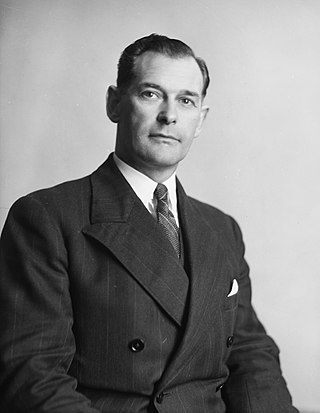
Sir Keith Jacka Holyoake, was a New Zealand politician who served as the 26th prime minister of New Zealand, serving for a brief period in 1957 and then from 1960 to 1972, and also as the 13th governor-general of New Zealand, serving from 1977 to 1980. He is the only New Zealand politician to have held both positions.

William Ferguson Massey was a politician who served as the 19th prime minister of New Zealand from May 1912 to May 1925. He was the founding leader of the Reform Party, New Zealand's second organised political party, from 1909 until his death.
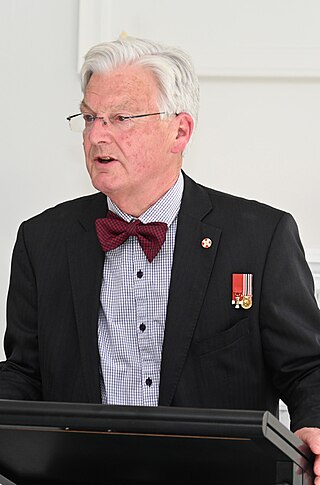
Peter Francis Dunne is a retired New Zealand politician who was the Member of Parliament (MP) for Ōhāriu. He held the seat and its predecessors from 1984 to 2017 – representing the Labour Party in Parliament from 1984 to 1994, and a succession of minor centrist parties from 1994. He was the Leader of Future New Zealand from 1994 to 1995, United New Zealand from 1996 to 2000, and United Future from 2000 to 2017.

Sir James Allen was a prominent New Zealand politician and diplomat. He held a number of the most important political offices in the country, including Minister of Finance and Minister of Foreign Affairs. He was also New Zealand's Minister of Defence during World War I.

Maurice Donald Williamson is a New Zealand politician and former diplomat.
The Social Democratic Party of New Zealand was an early centre-left to left-wing political party. It existed only a short time before being amalgamated into the new Labour Party. During its period of existence, the party held two seats in Parliament.

Sir Joseph George Ward, 1st Baronet, was a New Zealand politician who served as the 17th prime minister of New Zealand from 1906 to 1912 and from 1928 to 1930. He was a dominant figure in the Liberal and United ministries of the late 19th and early 20th centuries.

Joseph Gordon Coates served as the 21st prime minister of New Zealand from 1925 to 1928. He was the third successive Reform prime minister since 1912.
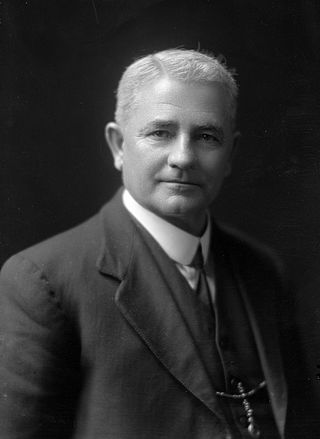
Henry Edmund Holland was an Australian-born newspaper owner, politician and unionist who relocated to New Zealand. He was the second leader of the New Zealand Labour Party.

The 19th New Zealand Parliament was a term of the New Zealand Parliament. It opened on 24 June 1915, following the 1914 election. It was dissolved on 27 November 1919 in preparation for 1919 election.
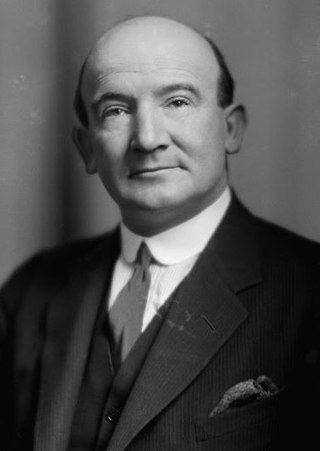
Patrick Charles Webb was a New Zealand trade unionist and politician.

The constitution of New Zealand is the sum of laws and principles that determine the political governance of New Zealand. Unlike many other nations, New Zealand has no single constitutional document. It is an uncodified constitution, sometimes referred to as an "unwritten constitution", although the New Zealand constitution is in fact an amalgamation of written and unwritten sources. The Constitution Act 1986 has a central role, alongside a collection of other statutes, orders in Council, letters patent, decisions of the courts, principles of the Treaty of Waitangi, and unwritten traditions and conventions. There is no technical difference between ordinary statutes and law considered "constitutional law"; no law is accorded higher status. In most cases the New Zealand Parliament can perform "constitutional reform" simply by passing acts of Parliament, and thus has the power to change or abolish elements of the constitution. There are some exceptions to this though – the Electoral Act 1993 requires certain provisions can only be amended following a referendum.
The Reform Government of New Zealand was the government of New Zealand from 1912 to 1928, led by the conservative Reform Party.
Franklin was a rural New Zealand parliamentary electorate. It existed from 1861 to 1996 during four periods.
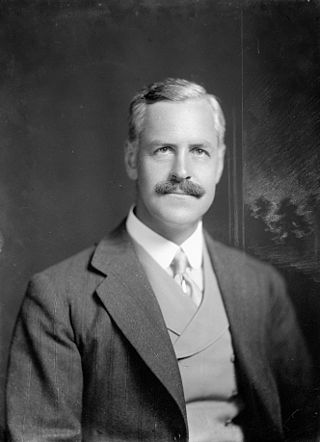
The 1917 Bay of Islands by-election was a by-election held on 19 March 1917 during the 19th New Zealand Parliament in the Northland electorate of Bay of Islands. The by-election came about because Vernon Reed's win in the 1914 general election had been declared void by an electoral court, and Reed barred from standing for a year. The seat was won by William Stewart, Reed's Reform Party colleague, in the resulting 1915 by-election. When Reed became eligible again, Stewart resigned and Reed won the 1917 by-election unopposed.
The Grey by-election of 1918 was a by-election during the 18th New Zealand Parliament. It was held on the 29 May 1918. The seat had become vacant due to the imprisonment of sitting member Paddy Webb who was jailed on the issue of his vocal opposition to conscription which had been enforced by Prime Minister William Massey. The by-election was won by the Labour candidate Harry Holland.

The Buller by-election of 1933 was a by-election during the 24th New Zealand Parliament in the Buller electorate. It was held on Wednesday 22 November 1933. The seat had become vacant due to the death of Labour party leader Harry Holland who was also the leader of the opposition. Two candidates contested the seat, and it was won by Labour's Paddy Webb, who defeated Liberal-Labour candidate H. Ian Simson from Hawke's Bay.
The Wellington North by-election of 1918 was a by-election held in the Wellington North electorate during the 19th New Zealand Parliament, on 12 February 1918. It was caused by the resignation of incumbent MP Alexander Herdman of the Reform Party, who was appointed as a judge of the Supreme Court, and was won by John Luke with a majority of 420.

The New Zealand Liberal Party leadership election 1913 was held on 11 September to choose the next leader of the New Zealand Liberal Party. The election was won by Awarua MP and former party leader Joseph Ward.
Conservatism in New Zealand, though related to its counterparts in other Western countries, developed uniquely over time. Advocates followed a political ideology that emphasised the preservation of traditional European beliefs, institutions and practices.